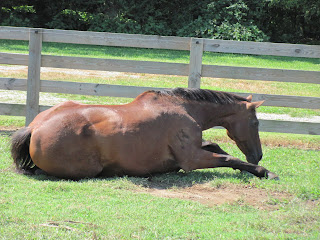Caring for the horses is definitely the fun part of our job. It is also the part that the public and our clients intuitively understand. Keeping track of and maintaining sixty tires and all the equipment that sits atop them, two hundred or more acres of land plus barns, run-in sheds, and miles of fence is less intuitive, definitely has less "sex appeal" to the public, but is equally necessary. So is keeping good records of what's going on with the horses, keeping their owners in the loop, scheduling vets and farriers, and keeping the bills paid and the cheques coming in.
We get a lot of inquiries every week from folks that are intrigued by what we do and who wonder if they could replicate our business for themselves. Judging by the number of inquiries we field, and how often we are told "I would love to do what you do," running a retirement farm seems to be a dream job for a lot of people. It is definitely a lot of fun but a lot of the work we do does not carry the same allure as interacting with the horses. I told Melissa earlier today that I think I'm going to start replying to all of these people who ask about running a retirement farm with a question, "what do you know about tires ?" If nothing else the responses should be interesting.
_______________________________________
Homer
Apollo and Hemi
Grand and Elfin
Slinky and Snappy
Thor
Fabrizzio finishing up a good roll
I love how the horses often walk across the pasture in single file; Romeo leading Winston, Silver and Lotus
B-Rad and Alex
Norman and Traveller
Calimba resting on MyLight with Cinnamon hanging out













3 comments:
great post about the reality of running a large farm. last week in our newspaper there was an article about horse retirement farms in our state. they say since it's becoming more popular to run one, the state will start requiring certification. that is typical germany - red tape for everything, that doesn't imply you're qualified, IMO. the farm they interviewed charges 150Euro per month and it had a large photo of a lady saying "goodbye forever" to her horse. it sounds like owners do not visit. the article started, "most horses who are not usable get put to sleep or slaughtered for food. some get to enjoy their years in a pasture." this one has 80 horses all living in a field all year (it's an area with sandy footing so they can stay out in winter). they say the horses are happy, they get hoof care and dental (no specifics about feed). they said it's the owners who have the problem, crying on saying goodbye. one thing i thought was interesting, they said, "Ideally, these retired horses will die in this field." from your perspective i wonder if you see the unexpected death in the field as the preferred way?
anyway that was all i got out of the article. i wanted to share it because i'm always curious about the differences in the horsey world here and home.
Although there was only one tire related incident - your post resonates with our recent experiences...
A sampling of one week:
-bearing went on big tractor
-broken throttle cable on trimmer
-disintegrated primer bulb on other trimmer (fuel in eye)
-bent blade + throttle spring on push mower
-ran over screw with trailer tire
At this point I might have said, "Hey Orange Krush (my little Kubota tractor) is the only piece of equipment not broken yet...
-broken tensioner spring and chewed up belt on little K
What do I know about tires? You can peel one off the front wheel of a tractor mighty quickly. Which makes the job take longer.
They are also really scarey to change when they're loaded.
Post a Comment